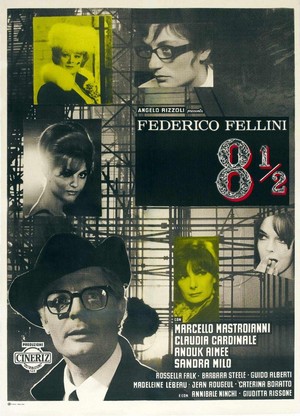
8½ (1963)
Otto e Mezzo / Federico Fellini's 8½ / Federico Fellini's 8 1/2 / Eight and a Half

Raiting: ![]() 8,1 /10
8,1 /10
Genre: Drama
Director: Federico Fellini
Stars: Marcello Mastroianni, Claudia Cardinale and Anouk Aimée
Country: Italy / France
Release date: 14 February 1963
Length: 138 minutes
"8½" (1963), directed by the legendary Federico Fellini, is a seminal film that blends reality, dreams, and memory into a mesmerizing tapestry that reflects the creative and personal turmoil of a film director. The title itself is a nod to Fellini's own filmography, representing this film as his eighth and a half work, considering his co-directions.
The story follows Guido Anselmi, a renowned Italian filmmaker played by Marcello Mastroianni, who is suffering from "director's block" while trying to prepare for his next movie. Overwhelmed by the pressure of expectations and his own ambition to make a great film, Guido finds himself at a spa to rest and recover, but instead becomes entangled in his thoughts and fantasies.
As Guido struggles to find inspiration for his film, he interacts with various characters, including his wife Luisa (Anouk Aimée), his mistress Carla (Sandra Milo), and a very opinionated film critic. These interactions are interspersed with surreal dream sequences that reveal Guido's inner desires, fears, and memories. The line between Guido's reality and imagination becomes increasingly blurred, reflecting the chaotic process of artistic creation.
Throughout the film, Guido is haunted by visions of his childhood and his past relationships, particularly with women. These reflections serve as both a source of inspiration and a cause of distress, as he grapples with his personal and professional responsibilities. The character of Claudia (Claudia Cardinale) appears as an idealized version of femininity and represents the purity that Guido longs for in his life and his art.
In a climactic scene, Guido imagines directing all the significant people in his life in a grand circus-like spectacle, which symbolizes his attempt to harmonize the various aspects of his existence. However, Guido's realization that life cannot be directed like a film leads him to a moment of clarity. He understands that embracing the imperfections of reality is the only way forward.
"8½" concludes with an enigmatic yet uplifting sequence, where Guido and the other characters join hands in a circle dance. This ending suggests a reconciliation with the complexities of life and an acceptance of the chaos that is inherent in the creative process. The film's open-ended nature invites multiple interpretations, making "8½" a timeless piece of cinema that continues to inspire and intrigue viewers with its innovative storytelling and visual flair.
Top cast - 8½ (1963)
Trailer - 8½ (1963)
Federico Fellini's "8½" is a cinematic masterpiece that transcends the boundaries of traditional storytelling to explore the psyche of a filmmaker in crisis. Released in 1963, it is a film that is as much a reflection on the human condition as it is a self-referential commentary on the process of filmmaking itself. The film's title, which refers to the number of films Fellini had made up to that point, cleverly sets the stage for a journey into the director's creative mind.
Marcello Mastroianni delivers an iconic performance as Guido Anselmi, the film's protagonist, whose artistic block serves as the central conflict of the narrative. Mastroianni's portrayal of Guido is both charismatic and deeply vulnerable, allowing the audience to empathize with his struggle to balance his creative ambitions with his personal demons. The supporting cast, including Anouk Aimée, Sandra Milo, and Claudia Cardinale, each bring depth and complexity to their roles, further enriching the film's tapestry of characters.
Fellini's direction is nothing short of visionary. "8½" is celebrated for its avant-garde narrative structure, seamlessly weaving together reality, dreams, and memories to create a kaleidoscopic experience. The film's dream sequences are particularly striking, filled with rich symbolism and surreal imagery that challenge the viewer's perceptions and invite multiple interpretations. Nino Rota's musical score complements the film's visual poetry, capturing the whimsical and melancholic tones of Guido's inner world.
The cinematography in "8½" is exquisite, with each frame meticulously composed to reflect the emotional landscape of the characters. Fellini's use of stark black-and-white photography emphasizes the contrasts and contradictions inherent in Guido's life and work. The film's visual style, combined with its innovative editing techniques, creates a rhythm that is both captivating and disorienting, mirroring the protagonist's tumultuous journey.
While "8½" may be challenging for some viewers due to its non-linear narrative and abstract themes, it is precisely these qualities that have cemented the film's status as a groundbreaking work of art. It is a film that not only withstands repeated viewings but also rewards them, offering new insights and revelations with each experience. The film's exploration of creativity, identity, and the complexities of human relationships is as relevant today as it was at the time of its release.
In conclusion, "8½" is a film that stands as a monumental achievement in world cinema. It is a testament to Fellini's genius and his ability to craft a film that is both deeply personal and universally resonant. With its innovative storytelling, compelling performances, and visual splendor, "8½" is a film that continues to inspire filmmakers and captivate audiences, remaining an enduring classic that deserves to be celebrated for generations to come.




